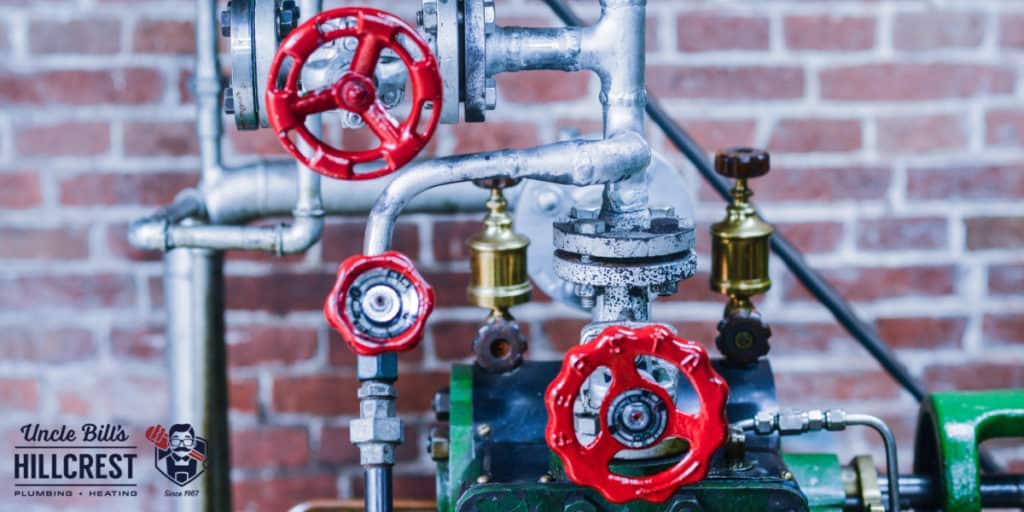Plumbing and heating emergencies happen unexpectedly, and they can cause significant property damage in residential homes. When emergencies happen, it’s best to stay calm and contact a professional.
Let’s explore the top 6 most common plumbing and heating emergencies, including how to prevent them.
Burst Water Pipe
Causes
Speaking of frozen pipes, they’re one of the most common causes of *burst* pipes. That’s because, when water freezes, it expands. If the pipe it’s in doesn’t have enough room for the water to expand up or down the pipe, it’ll expand outward instead. That outward pressure can lead to cracked or completely ruptured pipes.
Another common cause of burst residential pipes is corrosion. Over time, mineral deposits can collect. If you do not have your pipes inspected, this could go unnoticed. Eventually, the pipes can become corroded, causing holes where water can escape.
What to Do While you Wait
Burst water pipes are one of the most common and most urgent plumbing emergencies. Call your plumber immediately if you see water collecting or spilling from your pipes. Burst pipes can lead to permanent water damage if they are left unnoticed. While you are waiting for your plumber to arrive, try to turn off the water supply in your home. Remain calm and find towels to help soak up the water if it is clean.
Future Prevention
Sometimes burst pipes can not be avoided, however, proper plumbing and pipe maintenance checks are an excellent way to discover problems early. If your plumber notices signs of poorly insulated pipes or corroded pipes, they can help to fix the problem, before it becomes a plumbing emergency. Learn more about how to prevent plumbing and pipe leaks in our recent blog article and watch for these signs to detect leaks early.
Sewage Backup
Causes
Sewage backups are typically caused by pressure imbalances.
Fluid pressure imbalances are the most common, and they’re usually the result of high volume precipitation or heavy snowmelt. Both introduce massive amounts of water into the sewage system within a short period of time. If more water flows into the system than it can accommodate, the water will look for a way out, and that means flowing back up sewage pipes into homes and businesses.
Less frequently, air pressure can also cause sewage backups. In most cases, this is caused by maintenance or flushing happening elsewhere in the sewage system.
Lastly, blockages are also one of the main culprits behind backups. The reasoning there is simple — if sewage is continually being added but isn’t draining away, it’ll eventually overflow.
What To Do While You Wait
Start by opening a nearby window or running an exhaust fan to remove any sewage gasses that have been discharged during the backup. From there, what you do next will depend on how severe the backup is.
If it’s a small backup that’s confined to one area of a room or level, you’ll want to mop up the water and wash down all of the affected areas with disinfecting soap and hot water. If you think water has seeped below the floor or into the walls in any areas, note them down so the plumber can inspect them later.
If the backup is severe enough that it’s pooling on the floor and you can’t access the area without entering the water, you should call the utility company and have the electricity turned off. Beyond that, there’s not much more that can be done until the water drains away or is pumped out with professional equipment.
In both cases, it’s a good idea to take pictures of affected areas if you plan on submitting coverage claims to your insurance company.
Future Prevention
Backflow prevention devices are specifically designed to stop sewage water from flowing in reverse and contaminating an area. They’re effective at preventing air or water pressure-related backflow from getting into your home.
In certain areas, backflow prevention installation and testing are mandatory for businesses and multi-residential complexes, but those precautions generally don’t apply to single family homes. However, these types of homes can still have backflow prevention devices installed as a cautionary measure.
For blockage-related backlow, the best prevention comes from awareness. By being mindful of what kinds of material and objects are sent down a sink or toilet, you can significantly lower the chances of a blockage developing.
Leaking Boiler
Your boiler keeps your home warm and ensures you always have hot water. When a boiler shows signs of leaking, however, it can be more harmful than helpful. Not only is boiler water scalding hot, but it also has the potential to flood your home.
Causes
If the boiler is new and was installed recently, improper installation could be the reason. There could also be a problem internally, often worn out seals can give in overtime, causing leaks. Corrosion can also affect boilers. Minerals in the water supply can wear away at the boiler from the inside. And they are also susceptible to rust, which leads to holes and leaks.
What to Do While you Wait
While you wait for a plumbing professional, place a bucket or towels under the leak to help minimize water damage. If possible, shut off the boilers water supply and move any objects out of the way. Your plumber will determine what happened and may recommend you replace parts, or simply replace the boiler.
Future Prevention
Proper boiler maintenance checks are essential to help prevent boiler leaks in the future. If your boiler is older and you have experienced leaks in the past, it may be best to replace the appliance. The average boiler lasts for around 10 years if it is well maintained.
Flooded Basement
Causes
A flooded basement can have many different causes. It could be the result of a burst pipe, a poor drainage system, sewage backup, structural flaws in your home or a leaking appliance, such as a boiler or hot water tank.
What to Do While you Wait
Turn off the water supply if you can see the cause of the leak. Do not stand in the basement or touch the water. If you can not identify the source of the flood it’s possible the water is contaminated or unsafe. It may be a good idea to photograph the flooded areas and any signs of water damage for insurance purposes. Wait for your plumber to arrive. If you know that your hot water tank was the source of the problem and you’re not sure whether you should switch to a tankless option, we’d also suggest reading our detailed Hot Water Tank Buyer’s Guide for a full comparison of both types.
Future Prevention
Be sure your home is properly insured. Floods can be the result of a plumbing emergency, but they can also be caused by natural disasters and poor home construction. It’s a good idea to get home insurance that will cover some of the damage that floods can cause.
Clogged Drain
Causes
The drains in your home can become clogged over time. Hair is the most common culprit of clogged drains, but food waste and even mineral build-up could be to blame. Outside, mud and soil can clog drains around your home, which leads to backflow and waste. A clogged drain is a serious problem because it can lead to flooding.
What to Do While you Wait
If the sink or toilet pipes are clogged, turn off the water supply and wait for your plumber. You can also try to fix the clog yourself if it is minor. We have created a helpful post called “How to Use a Drain Snake“ to help assist with this process.
Future Prevention
If the clog was the result of hair and debris blocking the pipes, you can purchase a hair filter for your sink or shower. This will keep hair from getting into the drain and can be purchased at your local hardware store. We also have a helpful post that illustrates how to identify and clean mineral deposits from your sink and shower. As well as a fast method to unclog your shower in seconds.
If the clog was a result of excess food or debris in the kitchen sink, try to use a green bin to compost excess food scraps, rather than trying to garburate them. Also, be sure you never pour any of these items down the sink. However, the best way to prevent clogged drains is with a drain inspection.
Unresponsive Furnace
Causes
Age is the most common reason for a furnace to stop working. It’s also possible that you have blown a fuse, a clogged air filter or you have a crack in the heat exchange. On average, a furnace can last for up to 15-20 years with proper maintenance but if your furnace is older, it’s best to start thinking about your replacement options.
Often furnace problems go unnoticed. Signs of a failing furnace include lack of heat in the home, odd sounds from the furnace, or you see the gas bill going up.
What to Do While you Wait
Often, furnace maintenance problems and emergencies happen in the winter months, when the furnace is being used heavily. Chances are, if your furnace has failed, your home will feel much colder so it’s best to bundle up and stay warm. You can also check your furnace room for the emergency on and off switch. This is often red in colour and will power down the furnace in an emergency situation if it is not running properly.
Future Prevention
Watch for the signs that your furnace is failing, and contact your HV/AC specialist before the problem worsens. It may feel as though your furnace is no longer heating properly or as effectively as it could. Furnaces should have annual scheduled maintenance checks. If you have an older furnace or you have experienced several problems with your furnace in the past, it may be time to think about furnace replacement options.
Bonus tip: Add emergency numbers to your phone’s contact list
When it comes to emergencies, every second counts.
So, instead of spending precious time figuring out who to call after an emergency, it’s better to have all the numbers ready to go when you need them.
You’ll want to add:
- The utility company’s emergency hotline number to shut off electricity, water, or gas to your home depending on the situation.
- A trusted plumbing company with available 24/7 emergency service to answer your questions, direct you on what to do, and be on-site in just a few minutes.
Looking for a plumbing company with 24/7 service?
Call Hillcrest Plumbing & Heating for 24/7 emergency plumbing service. Experienced plumbing technicians will be dispatched to your home ASAP.
Our crews service all of Vancouver and the Lower Mainland, and – when you need it most – they’ll be ready to help. If you have questions about our emergency services or have a plumbing project in mind, call (604) 879-1415 or send us a message online.

